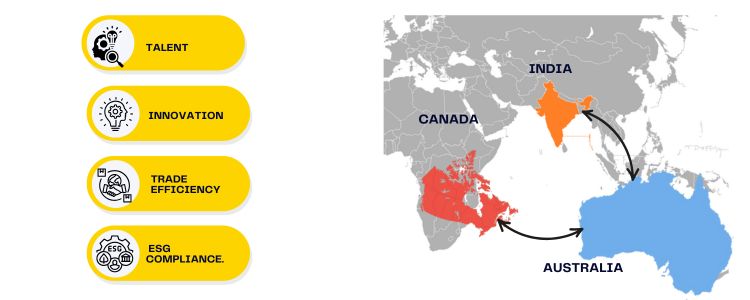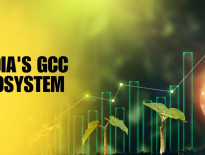
Since Inductus GCC is one of the top GCC enablers, it finds itself in the booming Indian market. We have the privilege of learning firsthand the impressive economic growth trend in India. India has a soaring GDP growth of 7.6% projected in FY24 as forecasted by the National Statistical Office, with a booming middle class propelling consumption, and India offers inimitable prospects. This has tremendously been strengthened by its ever-growing relationship with the Global capability centers (GCC). India and the GCC are increasingly interdependent in their economic interests, with bilateral trade between the two regions running at around $183 billion in FY23. This potent combination is now mature, and we think to consider the strategic benefits of adding Australia and Canada to this tectonic equation in support of a Trilateral Convergence that is all but guaranteed to optimise our own prosperity and strength.
The bond between India and the GCC is based on security of energy and people-to-people links. India is also a major consumer of GCC hydrocarbons, and conversely, the GCC is becoming more and more dependent on India for food security and skilled labour. The population of India exceeds 8 million people, so it is playing an important role in the encouragement of two economies through remittances, as well as their direct involvement in numerous industries. In addition to these conventional relationships, the current talks of an India-GCC Free Trade Agreement (FTA) are a new wave of increased economic engagements. This FTA promotes a cut in tariffs, eased custom processes, and enlargement of the investment flows between various areas such as manufacturing, technology, and services. Due to the high levels of investment in digitisation and infrastructure development in India through GCC sovereign wealth funds, this relationship is already being strengthened.
The integration with Australia or Canada in this strategic alliance gives particular complementary benefits. Australia: Australia possesses high-tech and has high agricultural technology along with having some of the world’s best resources, so it may be a significant contributor in terms of energy transition (through critical minerals and possibly green hydrogen) and food security in India. The present bilateral exports, which have a value of more than AUD 37 billion in 2022-23, increase significantly due to the recent Economic Cooperation and Trade Agreement (ECTA) between India and Australia. Such a trilateral synergy can generate more robust supply chains and can make the GCC countries act as strategic hubs in terms of Australian commodities being distributed to the vast Indian market. Canada: Canada has masters in business such as clean technology, education and sustainable agriculture. Although the present relationship between India and Canada in trade has found recent setbacks, structural economic complementarities between the two countries are good. These ties can be re-energised through a trilateral arrangement that can lead to joint research and development, technology transfer, and joint ventures, especially in the case of the GCC.
Although this trilateral convergence has enormous potential, there are some challenges, which must be resolved. These involve engaging geopolitical complexities, simplifying the regulatory setting between the three regions, and investing in a strong logistical infrastructure system. We would like to offer a systematic solution in order to achieve the maximum potential:
We feel, as a GCC service provider especially present in the Indian ecosystem, that having a strategic partnership involving India, the GCC and countries such as Australia and Canada will be the key to realising a great deal of economic benefits for the involved parties. The mutually beneficial exploitation of the individual strength and resource base of the two partners will enable jointly built more resilient supply chains, faster innovation, and the development of a gunless world of collective prosperity. It is not a matter of speculation that the Trilateral Convergence is becoming not a fact but an imperative leading to future growth and stability.
GCCs are massively rooting India into the global innovation chain since they provide scalable cost-efficient and high-quality solutions to multinational partners. The essential areas are mining computerisation, renewable energy, water technology, and climate innovations. The areas are finance, cybersecurity, AI/ML, clean technology, and health tech. All three countries are benefiting as GCCs are becoming hubs of ESG reporting, carbon credit analytics, and circular economy innovation. Yes, new CEPA negotiations, strategic dialogues and identification of each other’s digital trade rules are hastening collaboration. Aditi, with a strong background in forensic science and biotechnology, brings an innovative scientific perspective to her work. Her expertise spans research, analytics, and strategic advisory in consulting and GCC environments. She has published numerous research papers and articles. A versatile writer in both technical and creative domains, Aditi excels at translating complex subjects into compelling insights. Which she aligns seamlessly with consulting, advisory domain, and GCC operations. Her ability to bridge science, business, and storytelling positions her as a strategic thinker who can drive data-informed decision-making.
India and the GCC - A Striving Relationship
Inclusion of Australia and Canada in the Equation
Reimagining Trade Ties: A Sectoral Perspective
Sector
India-GCC Focus
Potential Australia/Canada Contribution
Trilateral Advantage
Energy
Oil & Gas supply to India, investments in Indian refineries.
Australian critical minerals, Canadian clean energy technologies.
Diversified and secure energy sources, collaboration in green energy projects, and R&D for a sustainable transition.
Food Security
Indian agricultural exports to the GCC.
Australian agritech and Canadian agricultural produce & technology.
Enhanced food security for the GCC, leveraging Australian expertise and technology to improve agricultural output in India and the GCC.
Technology & Digital Economy
Growing digital trade and Indian IT services in the GCC. India’s digital payments system (UPI).
Australia/Canada’s innovation ecosystems, cybersecurity expertise, and fintech startups.
A ‘Digital Triangle’ for joint ventures in fintech, cybersecurity, and AI, leveraging India’s talent pool to serve global markets from the GCC.
Education & Skill Development
Indian students seeking higher education in the GCC, India’s National Education Policy 2020.
Australia/Canada’s world-class universities and vocational training institutions.
Mutual recognition of qualifications, joint research programmes, and skill development partnerships to address global talent shortages and promote student mobility.
Healthcare & Pharmaceuticals
Indian pharmaceutical exports to the GCC, India’s rise as a “pharmacy of the world.”
Australia/Canada’s advanced medical research, healthcare technology, and clinical trial expertise.
Collaboration in medical research, development of new drugs, and a streamlined regulatory framework for the tri-region, enhancing global healthcare access.
Space & Defense
India’s growing space programme (ISRO) and domestic defence manufacturing.
Australia/Canada’s defence technology, satellite-based services, and maritime domain awareness expertise.
Joint ventures in defence manufacturing, collaborative space missions, and enhanced maritime security cooperation to ensure regional stability and a secure Indo-Pacific.
Tourism & Hospitality
The GCC is a major source market for Indian tourism and Indian skilled labour in GCC hospitality.
Australia/Canada’s diverse tourism offerings and expertise in managing niche segments like ecotourism and adventure travel.
Promotion of ‘two-way tourism,’ skill development for the hospitality sector, and joint marketing initiatives to attract international visitors across the trilateral region.
Obstacles and the Way Forward

Conclusion
frequently asked questions (FAQs)

Aditi
Hey, like this? Why not share it with a buddy?
Related Posts
Recent Blog / Post
- Pharma GCC Setup Services in India: Strategic Considerations for CXOs January 9, 2026
- Why Enterprises Are Rethinking Their GCC Strategies in 2026 January 8, 2026
- Why Most Enterprise Expansion Strategies Fall Short of Projections, And How a GCC Enabler Can Bridge the Gap January 7, 2026
- India’s GCC Ecosystem: Why the World’s Biggest Companies Are Betting Their Future on it January 3, 2026
- Healthcare GCCs in India: Where the World’s Pharmaceutical Innovation Actually Happens January 2, 2026
- Circular Economy Models and Their Relevance to Manufacturing GCCs December 30, 2025
- GCCs in Agritech: Digitizing Global Food Security December 29, 2025
- Renewable Energy GCCs: Accelerating Global Green-Tech Development December 29, 2025
- Cyber Resilience 2030: Multi-Layer Security Architecture for GCCs December 26, 2025
- Building an Integrated Risk Management Framework for Multi-Region GCCs December 26, 2025
- The Ethics of Automation: How GCCs Maintain Human Oversight in AI Workflows December 25, 2025
- Future of HR in GCCs: Data-Led, Skills-Based, and GenAI-Driven December 25, 2025
- The Proposal to Standardize India’s GCCs for Unshakeable Global Leadership December 24, 2025
- Global Capability Centers: A Strategic Growth Model for B2B Enterprises December 24, 2025
- AI Ethics & Compliance Mandates for GCC Operations in 2025 December 23, 2025
















